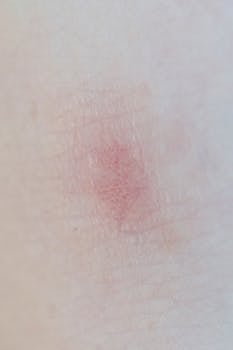
More Allergy, Asthma & Infectious Disease Articles
Unraveling the Mystery of Bumps on Your Leg: What They Could Mean

Discovering a bump on your leg can be concerning, and it’s natural to wonder, “what does a bump on leg mean?” While some bumps are harmless and common, others might require medical attention. Understanding the nature of these lumps can help you determine the next steps and seek appropriate care if needed.
What Does a Bump on Leg Mean?
Bumps on the leg can be caused by a variety of factors, each with its own implications. Causes can range from benign conditions like lipomas and cysts to inflammatory conditions such as folliculitis. Additionally, infections or trauma to the skin may result in the formation of a bump.
Common Causes of Leg Bumps
Let’s explore some common reasons for bumps on your leg:
- Folliculitis: This occurs when hair follicles become inflamed, often due to bacterial or fungal infection. It typically manifests as red, pus-filled bumps.
- Lipoma: A lipoma is a soft, fatty lump that grows beneath the skin. These are usually painless and benign.
- Cysts: Sebaceous cysts are noncancerous lumps filled with a cheesy substance. They are usually harmless but can become infected.
- Sports Injuries: Impact or pressure from falls or sports can lead to bruises or bumps due to bleeding under the skin.
When to Seek Medical Attention
Most leg bumps are not serious and resolve on their own. However, it’s essential to consult a healthcare provider if the bump grows rapidly, is painful, or is accompanied by symptoms like fever or changes in skin color. Persistent or unusual bumps should also be evaluated.
Lifestyle Factors and Bumps
Lifestyle choices can also influence the development of skin bumps. For instance, maintaining a balanced diet and exercising regularly can enhance skin health. You might find our article on the importance of a high-protein diet for weight loss helpful in understanding how nutrition affects your overall health.
Understanding Inflammatory Conditions
Conditions such as eczema or psoriasis can lead to bumps and rashes on the skin. These require specific treatments and management strategies. It’s crucial to consult a dermatologist for a proper diagnosis and treatment plan.
Preventing Bumps on Your Leg
While not all bumps can be prevented, some measures can minimize the risk. Proper hygiene, wearing appropriate clothing during physical activities, and avoiding known allergens can help reduce the occurrence of skin irritations and infections.
For more in-depth knowledge on skin health, you can explore resources like this page on Health.
In conclusion, when asking “what does a bump on leg mean,” it’s important to consider various factors including severity, accompanying symptoms, and lifestyle habits. Always seek medical advice if you are uncertain or concerned about a bump on your leg.
- Many leg bumps are benign and resolve on their own.
- Consult a doctor for any persistent or painful bumps.
- Folliculitis and cysts are common causes of leg bumps.
- Lifestyle choices, such as diet, can affect skin health.
FAQs
What should I do if I notice a bump on my leg?
If you notice a bump on your leg, monitor it for changes in size, color, or symptoms of pain. If it persists or is concerning, consult a healthcare provider for an evaluation.
Are leg bumps a sign of cancer?
While most bumps are benign, some rare types could be cancerous. It’s important to seek medical attention for a proper diagnosis if you are concerned.
Can diet affect the development of skin bumps?
Yes, a balanced diet can contribute to overall skin health. Poor nutrition may exacerbate skin conditions. Consider reading more on how a high-protein diet can benefit weight loss and overall health.
Is it safe to treat leg bumps at home?
Mild bumps may be treated at home with proper hygiene and over-the-counter solutions. However, it is important to consult a doctor before trying home remedies, especially if the bump is painful or unusual.
What are some common causes of itchy bumps on the legs?
Itchy bumps can be symptoms of folliculitis, allergies, or eczema. Identifying the underlying cause is key to managing and treating this symptom effectively. Consult a dermatitis specialist for guidance.
Other Articles You May Find of Interest...
- What You Need to Know About Managing MCAS Rash Symptoms
- Can Hepatitis B Be Cured? Exploring Treatment Options and Outcomes
- Perfecting Your Neti Pot Experience: The Ideal Salt Water Ratio for Optimal Results
- Is Sighing Dyspnea a Sign of a Greater Health Issue?
- Pleurisy: Understanding Causes, Symptoms, and Treatment Options
- Chills Without Fever: What Causes Them and Should You Be Concerned?
- Effective Solutions for Rid Lice Treatment: What Works Best?














